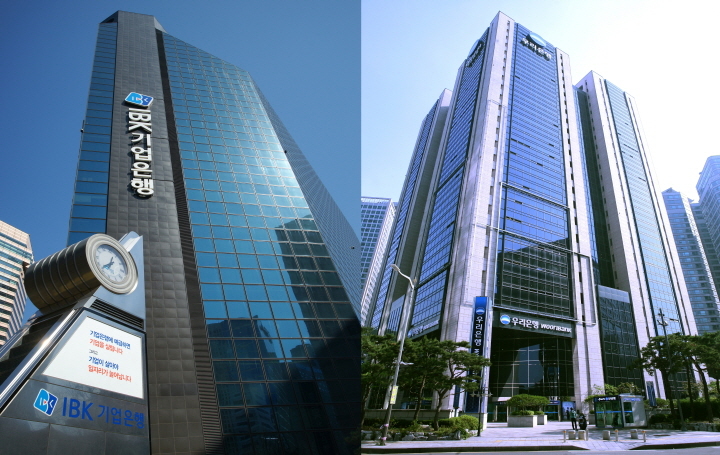Woori, IBK suffer earnings slump in Q2 on coronavirus, fund misselling
By Jung Min-kyungPublished : July 27, 2020 - 22:16

Woori Bank and Industrial Bank of Korea reported on Monday that their second-quarter net profit plummeted by 45 percent and 25 percent, respectively, weighed down by risks stemming from the coronavirus and hedge fund misselling.
Woori Bank’s net profit for the April-June period slipped 45.28 percent on-year to 682.1 billion won ($570.2 million), while its operating profit fell 35.04 percent to 1.3 trillion won. But revenue increased 21.34 percent to 13.8 trillion won.
The commercial bank’s holding company Woori Financial Group saw its net profit for the first-half of 2020 drop 44 percent to 660.5 billion won.
Its rival, state-run lender IBK, posted a net profit of 320.6 billion won -- down 25.3 percent -– with operating profit slipping 26 percent to 426.7 billion won. Its revenue also fell 25.2 percent to 3.9 trillion won in the three-month period.
While the banks cited the latest pandemic as reasons behind their weak performance, other risks including the record-low interest rate set by the central bank and misselling of derivatives-linked products apparently worked as key setbacks.
“(The figure for the first-half of the year) was due to the longer-than-expected coronavirus pandemic outbreak and investments to counter uncertainties related to private equity funds,” Woori Financial Group Chairman Sohn Tae-seung said in a statement.
The Bank of Korea’s decision to slash the benchmark interest rate to a historic low of 0.5 percent in May, to minimize the economic fallout from the pandemic, has led to a noticeable drop in yields on savings and checking accounts offered by local lenders t0 near zero percent. Commission fees from products and loans continue to be a key source of revenue for Korean banks, prompting experts to call for the need to diversify their options.
Woori Bank and IBK have both been recently under fire for misselling problematic funds to customers, with the fiasco related to such high-risk products dampened investor sentiments and overall slowed cash inflows into private equity funds. According to the Korea Financial Investment Association, private equity funds under management came to 20.7 trillion won as of May, which declined by 500 billion won on-month and marked the lowest level since July 2018.
IBK had sold 69.5 billion won worth of funds that were hit with liquidity issues and designed by Discovery Asset Management to 200 investors, who have been seeking redemption, reports earlier this year showed.
Woori Bank was fined 19.7 billion won by the Financial Supervisory Service earlier this year for misselling derivatives-linked products to its customers, and was accused of failing to give adequate information to the investors.
By Jung Min-kyung (mkjung@heraldcorp.com)
Woori Bank’s net profit for the April-June period slipped 45.28 percent on-year to 682.1 billion won ($570.2 million), while its operating profit fell 35.04 percent to 1.3 trillion won. But revenue increased 21.34 percent to 13.8 trillion won.
The commercial bank’s holding company Woori Financial Group saw its net profit for the first-half of 2020 drop 44 percent to 660.5 billion won.
Its rival, state-run lender IBK, posted a net profit of 320.6 billion won -- down 25.3 percent -– with operating profit slipping 26 percent to 426.7 billion won. Its revenue also fell 25.2 percent to 3.9 trillion won in the three-month period.
While the banks cited the latest pandemic as reasons behind their weak performance, other risks including the record-low interest rate set by the central bank and misselling of derivatives-linked products apparently worked as key setbacks.
“(The figure for the first-half of the year) was due to the longer-than-expected coronavirus pandemic outbreak and investments to counter uncertainties related to private equity funds,” Woori Financial Group Chairman Sohn Tae-seung said in a statement.
The Bank of Korea’s decision to slash the benchmark interest rate to a historic low of 0.5 percent in May, to minimize the economic fallout from the pandemic, has led to a noticeable drop in yields on savings and checking accounts offered by local lenders t0 near zero percent. Commission fees from products and loans continue to be a key source of revenue for Korean banks, prompting experts to call for the need to diversify their options.
Woori Bank and IBK have both been recently under fire for misselling problematic funds to customers, with the fiasco related to such high-risk products dampened investor sentiments and overall slowed cash inflows into private equity funds. According to the Korea Financial Investment Association, private equity funds under management came to 20.7 trillion won as of May, which declined by 500 billion won on-month and marked the lowest level since July 2018.
IBK had sold 69.5 billion won worth of funds that were hit with liquidity issues and designed by Discovery Asset Management to 200 investors, who have been seeking redemption, reports earlier this year showed.
Woori Bank was fined 19.7 billion won by the Financial Supervisory Service earlier this year for misselling derivatives-linked products to its customers, and was accused of failing to give adequate information to the investors.
By Jung Min-kyung (mkjung@heraldcorp.com)








![[Kim Seong-kon] Democracy and the future of South Korea](http://res.heraldm.com/phpwas/restmb_idxmake.php?idx=644&simg=/content/image/2024/04/16/20240416050802_0.jpg&u=)








![[KH Explains] Hyundai's full hybrid edge to pay off amid slow transition to pure EVs](http://res.heraldm.com/phpwas/restmb_idxmake.php?idx=652&simg=/content/image/2024/04/18/20240418050645_0.jpg&u=20240418181020)

![[Today’s K-pop] Zico drops snippet of collaboration with Jennie](http://res.heraldm.com/phpwas/restmb_idxmake.php?idx=642&simg=/content/image/2024/04/18/20240418050702_0.jpg&u=)